
Get the latest news from We the Governed delivered straight to your inbox -Subscribe Here
A few weeks ago, Washington State Governor Jay Inslee signed ESHB 2938 “Concerning campaign finance law enforcement and reporting.” Inslee was motivated to sign this bill, in part, because of his own failure to follow the state’s campaign finance laws (see PDC complaint linked here). Among Democratic party leaders and lawmakers, this was referred to as the “Stop Glen Morgan” bill, and this author discussed the many flaws in the original draft bill (linked here). However, the original bill was scrapped when it became apparent that only Democrats supported the obvious, self serving effort to extract themselves from the many legal violations that they committed of Washington State’s elegant campaign finance laws (RCW 42.17A). The Republicans opposed the original draft, and (unusually) were completely unified in opposition. The Democrats, having only a slim majority in the house and Senate were forced to recognize that only a bi-partisan effort would produce any reform at all. The bill went through a variety of iterations, including a partial veto by Governor Inslee, but in the end, the most significant bill reforming the state’s campaign finance law since the 1980s was signed into law and goes into effect June 7th.
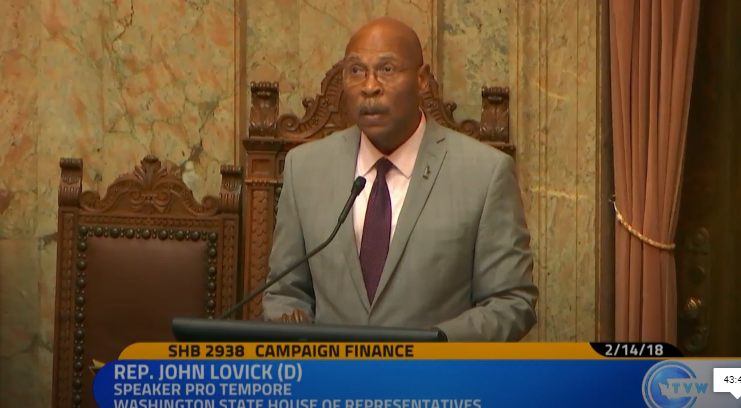
A majority of legislators are guilty of violating the law
When the revised bill was on the house floor for a vote, John Lovick (campaign finance complaints linked here, here, here, and here) addressed the fact that it was impossible to garner a quorum of legislators to vote on the bill due to the fact that so many of them had pending campaign finance complaints. In the Washington State Constitution, Article II, Section 30, states:
“…A member who has a private interest in any bill or measure proposed or pending before the legislature, shall disclose the fact to the house of which he is a member, and shall not vote thereon.” Washington State Constitution Article II, Section 30
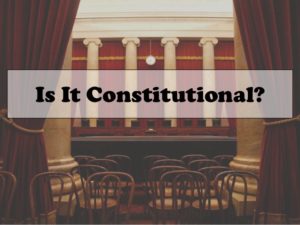 As Rep. Lovick states in the beginning, one way to avoid violating this statute is if the bill is prospective not retroactive. Also if the state constitution were to be applied to pending campaign finance complaints, it would not just be impossible to garner a quorum, but the pending complaints would deny the legislature the ability to make any changes to the statute, and thereby block the “plenary power” ( a complete and absolute power to take action on a particular issue, with no limitations) of the legislature. In the Washington State Constitution, plenary power for the rules used for passing laws is granted to the legislature under article II, Section 9.
As Rep. Lovick states in the beginning, one way to avoid violating this statute is if the bill is prospective not retroactive. Also if the state constitution were to be applied to pending campaign finance complaints, it would not just be impossible to garner a quorum, but the pending complaints would deny the legislature the ability to make any changes to the statute, and thereby block the “plenary power” ( a complete and absolute power to take action on a particular issue, with no limitations) of the legislature. In the Washington State Constitution, plenary power for the rules used for passing laws is granted to the legislature under article II, Section 9.

After speaking to many veteran legislators in Olympia, all of them informed this author that they had never before witnessed the need for a statement from the speaker like this to be read before passage.
Senator Billig (see campaign finance complaint here) recently complained to a group of Spokane Democratic Party (see AG lawsuit linked here) leaders that he had attempted, but failed to make this bill retroactive to current complaints. However, while many Democrat legislators attempted to make changes to the law to exempt themselves from their own failure to comply, all those efforts failed and the final bill does not have retrospective provision in it. For those already in the system, the old rules still apply.
It all started with an initiative in the people
 As this author has written about on numerous other occasions (see here, here,and here), the Washington State campaign finance laws were in need of some reform and updating. The law began as a successful initiative to the people passed in 1972 and included a variety of “Sunshine laws” including the Open Public Meetings Act (RCW 42.30), the Public Records Act (RCW 42.56), and the creation of the Public Disclosure Commission (RCW 42.17A.100). The campaign finance laws (RCW 42.17A) were largely focused on transparency in campaigns and elections. They required regular and public reporting of nearly all aspects of political campaigns including donors, expenditures, personal financial disclosure of candidates, and fines and penalties for violating those laws.
As this author has written about on numerous other occasions (see here, here,and here), the Washington State campaign finance laws were in need of some reform and updating. The law began as a successful initiative to the people passed in 1972 and included a variety of “Sunshine laws” including the Open Public Meetings Act (RCW 42.30), the Public Records Act (RCW 42.56), and the creation of the Public Disclosure Commission (RCW 42.17A.100). The campaign finance laws (RCW 42.17A) were largely focused on transparency in campaigns and elections. They required regular and public reporting of nearly all aspects of political campaigns including donors, expenditures, personal financial disclosure of candidates, and fines and penalties for violating those laws.
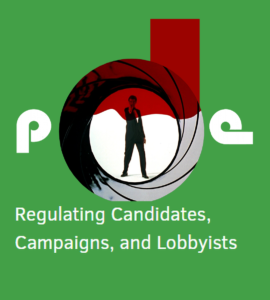
Washington State’s campaign finance enforcement system, largely embodied in the Public Disclosure Commission as the agency directed to manage record retention, record dissemination, and enforcement of the state’s campaign finance laws. The original intent was to have the violations of these laws by candidates or political committees exposed through a complaint driven process. This was based on the assumption that political contests would have at least two parties and the opposing parties would watch each other and report violations of the law to the Public Disclosure Commission (PDC).
The Republicans believe the PDC is corrupt, and stop filing complaints

While the political world is not always divided between “Democratic Party” and “Republican Party” contests, these are still the dominant labels used to define and categorize political contests. Over the past 20 years or so, the Republicans in Washington State largely stopped filing campaign finance complaints against their Democratic Party opponents. Based on this author’s interviews with dozens of Republican Party activists and leaders, this trend began because the Public Disclosure Commission was viewed as partisan and controlled by the Democratic Party.
 Part of this perception was because Democratic Governors had appointed all members of the PDC for decades. Additionally, nearly every staff member of the PDC, if they were active in politics, had a history of voting in Democratic Party primaries and had even run for office as Democratic Precinct Committee Officers. Additionally, 2013-2015 actions by the PDC to avoid enforcing the laws on California Billionaire Tom Steyer’s efforts to influence Washington State elections cemented the dominant view held by many Republicans that the PDC has been corrupted through partisan (Democratic Party) influence, and therefore the Republicans stopped filing complaints because most believed the PDC was corrupt anyway and would simply ignore, whitewash, or “memory hole” the complaints. Meanwhile, the Democratic Party was still filing complaints on a regular basis against targeted Republicans.
Part of this perception was because Democratic Governors had appointed all members of the PDC for decades. Additionally, nearly every staff member of the PDC, if they were active in politics, had a history of voting in Democratic Party primaries and had even run for office as Democratic Precinct Committee Officers. Additionally, 2013-2015 actions by the PDC to avoid enforcing the laws on California Billionaire Tom Steyer’s efforts to influence Washington State elections cemented the dominant view held by many Republicans that the PDC has been corrupted through partisan (Democratic Party) influence, and therefore the Republicans stopped filing complaints because most believed the PDC was corrupt anyway and would simply ignore, whitewash, or “memory hole” the complaints. Meanwhile, the Democratic Party was still filing complaints on a regular basis against targeted Republicans.

In 2016, this perception of the Republican Party insiders was reinforced by several events. The first was former PDC Executive Director Evelyn Fielding Lopez (see PDC complaint here) appeared to intervene on behalf of Democratic Party candidate and former legislator Tim Probst to help him avoid PDC trouble (see articles here and here – also PDC complaint here). The Republican Caucus leaders even drafted a letter demanding her resignation. After Lopez resigned and failed to win a campaign for Mayor of Tacoma, she began to further reinforce the perception that she had been biased in her management of the PDC by legally representing and defending the Pierce County Democratic
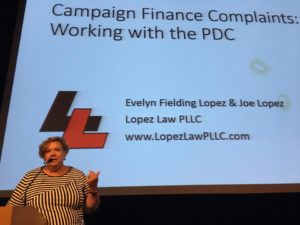
Party in a campaign finance lawsuit filed by the AG against them (initiated by a complaint filed by this author). Lopez also travelled the state and spoke at Democratic Party functions attacking this author and attempting to educate Democratic Party activists and insiders about the state’s campaign finance laws.
The current Executive Director Peter Lavallee has a real challenge attempting to change this perception among Republicans in the state. Primarily, this

challenge is related to his resume more than any actions he has taken. As a former AG employee hired to manage Attorney General Ferguson’s public relations for a number of years, and former Administrator of the Clinton Legal Expense Trust, the defense fund for then-President and First Lady Bill and Hillary Clinton. This isn’t a resume with a non-partisan air of neutrality. It will take substantial outreach and consistent demonstration of even handed treatment to resolve the Republican skepticism and mistrust of the PDC.
Democrats stop following the law because Republicans stop paying attention
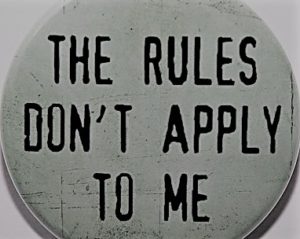 The inevitable result of the Republicans failure to hold the Democrats to account for failing to follow the state’s campaign finance laws is that the Democratic Party organizations, to various degrees, began to slip further and further away from compliance. As each year would go by and ever more egregious violations of the state’s campaign finance laws went unnoticed by their opposition, the Democrats understandably failed to comply. Rarely were there any consequences. The few exceptions were often intramural fights among Democrats (like this $290,000 judgment against Moxie Media from 2011).
The inevitable result of the Republicans failure to hold the Democrats to account for failing to follow the state’s campaign finance laws is that the Democratic Party organizations, to various degrees, began to slip further and further away from compliance. As each year would go by and ever more egregious violations of the state’s campaign finance laws went unnoticed by their opposition, the Democrats understandably failed to comply. Rarely were there any consequences. The few exceptions were often intramural fights among Democrats (like this $290,000 judgment against Moxie Media from 2011).
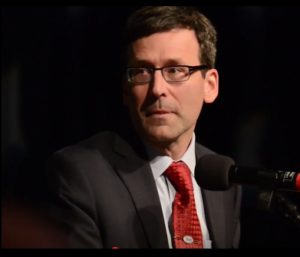
To add fuel to the smoldering fire of Republican campaign finance frustrations, Washington State’s Attorney General Bob Ferguson decided to emphasize campaign finance compliance in 2015 and he created a special campaign finance unit internal to the AG’s office. While AG attorney Linda Dalton had been in charge of campaign finance lawsuits for many years, the AG hadn’t reached a caseload volume to merit a special unit. However under Ferguson’s leadership, this changed. Now, there would be a dedicated cadre focused on tackling the cases “too big for the PDC.”
Immediately, the AG filed the biggest campaign finance lawsuit (and ultimately judgment) in state history ($19 million) against the Grocery Manufacturers Association, Tim Eyman – the initiative King and Democratic Party Boogeyman (see 9 press releases linked below), the Freedom Foundation (this author’s former employer years ago – see here, here, and here), and Ferguson also took a Democratic Party drafted complaint against the lone Republican elected to Washington State-wide office at the time – Secretary of State Kim Wyman and made a major media spectacle of her campaign finance violations (press releases here, here, and here). In each of these cases, Ferguson’s office used the lawsuits as media spectacles to further promote his increasing  emphasis on campaign finance enforcement. (Note: once this author started forcing the AG to file lawsuits against Democrats the universal press release spectacle stopped – there appears to now be two sets of rules at the AG for who gets press releases. Lawsuits against Republicans get lots of press releases. Lawsuits against Democrats get very few, if any).
emphasis on campaign finance enforcement. (Note: once this author started forcing the AG to file lawsuits against Democrats the universal press release spectacle stopped – there appears to now be two sets of rules at the AG for who gets press releases. Lawsuits against Republicans get lots of press releases. Lawsuits against Democrats get very few, if any).
Since the Republicans had largely stopped filing complaints, AG Ferguson could follow the Washington State Democratic Party lead and attack targeted Republicans like Wyman and Eyman. No need to pay any attention to the violations of state Democrats because the Republicans weren’t filing complaints, and it is a complaint driven process. It was business as usual, and the business was good.

State Democratic Party attacks Glen Morgan, pushback, Democrats finally support reform
While this author was nominally familiar with the PDC laws, and had written some minor articles about how to use the PDC resources to find public records, I was no expert. The Washington State Democratic Party was very angry at this author’s involvement in the 2016 elections in the Thurston County Commissioner races, which resulted (for the first time in state history) with Thurston County being represented by three independent, unaffiliated commissioners without a single Democratic Party (or Republican, for that matter) member on the commission. In addition to death threats and Democratic Party lawsuits, this also led to PDC complaints against this author (since dismissed).
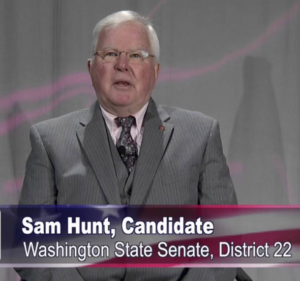
Inspired by the Washington State Democratic Party (see PDC complaints linked here, here, here, and here) (and some local politicians like Senator Sam Hunt – see PDC complaints linked here, here, and here), and using the “Wyman standard” established by the AG in its lawsuit against Kim Wyman, this author has filed only 375 PDC complaints since that time, many of which have resulted in AG lawsuits, fines, and Citizen Action Notice lawsuits against violators. As serious widespread violations of the state’s campaign finance laws (most include violations far in excess of the Wyman charges) were exposed and resulted in legal actions, fines, settlements, and a bit of angst, the groundwork for campaign finance reform was established. For the first time this century the Democrats had some incentive to reform the law because they finally experienced the joys and wonders of the law for themselves, which they had inflicted on their political enemies for decades with little response. The winds of change were in the air.
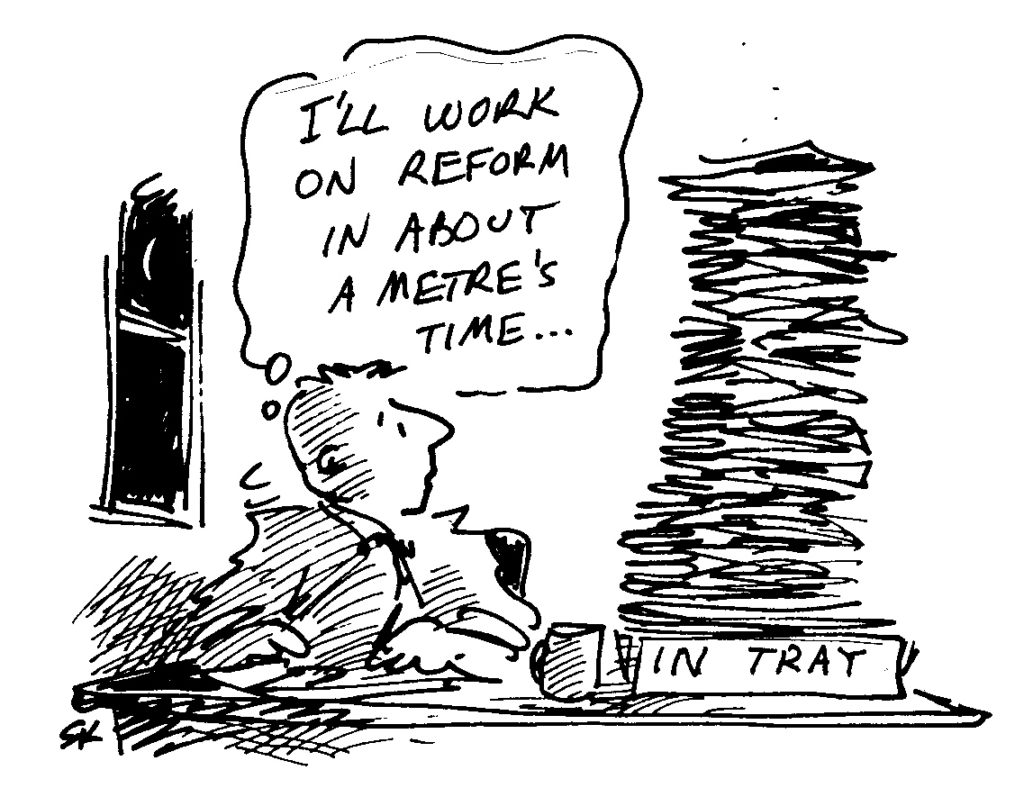
The challenges of reform – modest, minor, and a little risky

The biggest challenge with reforming the campaign finance law is one of perspective. Each party who receives a complaint filed against them ALWAYS claims that complaint is harassing, minor, technical, and unintentional. Each entity who files the complaint ALWAYS claims the violations are massive, criminal, horrible, and a threat to transparency in elections. The campaign finance law (RCW 42.17A) is a strict liability statute, and either the committee or candidate violated the law or they didn’t. The penalties can escalate or be mitigated based on severity and willfulness, but generally a penalty is in order if any violation was committed.
One problem is that everyone violates the law, at least in minor ways if not major. Some of these minor violations have little significant impact on the right of the public to know how campaigns are managed and funded, and they were improved and corrected in the recently signed bill (HB 2938). This author supported all of these minor reforms and changes. Here are some examples:
- Allowing anyone approved by the campaign to make deposits for the campaign (current law only allowed the treasurer)
- Allowing for minor, technical changes to expenditure and contribution reports. (under current law, every unreported financial disclosure is a violation)
- Updating the law to reflect modern communications including social media
- An improved definition of what an “independent expenditure” does NOT include like meeting with editorial boards, writing voter’s pamphlet statements etc (there had been some confusion on this in the past)
- Allowing for “technical” corrections to not count as violations worthy of punishment and some types of “remedial” violations
- Improved reporting timelines that are more realistic for online and Credit Card contributions.
- Explicitly expanding the language even further not allowing for illegally dissolution of committees or campaigns in an effort to avoid liability for breaking the law.
- Formal inspection of campaign books is changed to a more reasonable notice window (10 days rather than 8, 48hours rather than 24hours notice, etc)
- Increasing debt limit reporting from the current level of $250 to $750 and excluding regularly recurring “debts.”
 In addition to these changes to make good-faith effort compliance easier, the Public Disclosure Commission is given the opportunity (90 days) to resolve the complaint before the Attorney General or a Citizen Action Notice lawsuit can be filed in court. This is the element of the law that was greatly resisted by the Attorney General’s office. This is also where the previous Republican concerns about the Public Disclosure Commission come into focus. The Republicans have definitely taken an extreme risk in trusting the PDC to be non-partisan and fair in how it treats complaints. This is particularly true considering the Republican’s publicized concerns about the PDC in the recent past.
In addition to these changes to make good-faith effort compliance easier, the Public Disclosure Commission is given the opportunity (90 days) to resolve the complaint before the Attorney General or a Citizen Action Notice lawsuit can be filed in court. This is the element of the law that was greatly resisted by the Attorney General’s office. This is also where the previous Republican concerns about the Public Disclosure Commission come into focus. The Republicans have definitely taken an extreme risk in trusting the PDC to be non-partisan and fair in how it treats complaints. This is particularly true considering the Republican’s publicized concerns about the PDC in the recent past.

Arguably, this change will still ensure that only the most egregious cases go to litigation, which is a good reform outcome if it proves to be realized. However, if the PDC begins making subjective decisions which benefit preferred political groups with slaps on the wrist (Democratic Party, unions, “Green” organizations, Leftist Billionaires, etc) over others (Republicans, Libertarians, Tea-Party, etc) despite objective violations being similar or even identical, then future reforms of the PDC are almost certain, and the credibility of this institution will be put at even greater risk.
 One challenge faced by the PDC is the institutional desire to have maximum discretion to recommend disparate fines and penalties based on subjective criteria unrelated to the violation itself. For example, investigative staff will often adjust fines based on how “nice” the defendant treated them, or because staff just felt that some of the people who committed the exact same violation at the exact same time just deserved different penalties. One recent example of this was a complaint (linked here) out of the Tri-Cities against 5 different police chiefs for violating RCW 42.17A.555 for misusing public resources to support a ballot proposition. All five committed the exact same violation, and despite the fact the violation was televised and easy to verify, PDC staff spent over 400 staff hours to verify the violations, and then only fined three of the violators $750 and suspended the penalties for the other two. This resulted in an unusual split decision vote by the PDC, but the staff-created disparities of fines were approved despite the random, subjective nature of the justifications.
One challenge faced by the PDC is the institutional desire to have maximum discretion to recommend disparate fines and penalties based on subjective criteria unrelated to the violation itself. For example, investigative staff will often adjust fines based on how “nice” the defendant treated them, or because staff just felt that some of the people who committed the exact same violation at the exact same time just deserved different penalties. One recent example of this was a complaint (linked here) out of the Tri-Cities against 5 different police chiefs for violating RCW 42.17A.555 for misusing public resources to support a ballot proposition. All five committed the exact same violation, and despite the fact the violation was televised and easy to verify, PDC staff spent over 400 staff hours to verify the violations, and then only fined three of the violators $750 and suspended the penalties for the other two. This resulted in an unusual split decision vote by the PDC, but the staff-created disparities of fines were approved despite the random, subjective nature of the justifications.
The PDC must be forced to make hard decisions and provide clarity
The biggest challenge with the PDC will be the inevitable need to avoid being too “easy” on violators and therefore transforming all violations of the state’s campaign finance laws into just another “cost of doing business.” Another even more difficult challenge will be to provide policy clarity, in writing, and in practice about the actual definition of “technical” or “remedial” violations. The PDC staff resists this clarification because it restricts arbitrary power and decisions based on feelings, personal relationships, and political bias rather than facts and predictable outcomes of violations. Maximum agency discretion produces maximum power and often unfair or unequal results. Predictable policies with less vague “flexibility” would reduce the power of the agency.
 Another challenge the PDC will face is the AG’s promised effort to reassert it’s ability to file lawsuits when it feels empowered and inspired to do so. Right now, this law will restrict the AG slightly, and the AG (and Governor Inslee) has stated they will push for more changes this next legislative cycle. More reform is coming, but the PDC can tamp down some of these concerns and the pressure by providing predictable clarity and unambiguous decisions in a timely manner. The increased budget for this agency should help, but skepticism abounds.
Another challenge the PDC will face is the AG’s promised effort to reassert it’s ability to file lawsuits when it feels empowered and inspired to do so. Right now, this law will restrict the AG slightly, and the AG (and Governor Inslee) has stated they will push for more changes this next legislative cycle. More reform is coming, but the PDC can tamp down some of these concerns and the pressure by providing predictable clarity and unambiguous decisions in a timely manner. The increased budget for this agency should help, but skepticism abounds.
Improving compliance and escalating litigation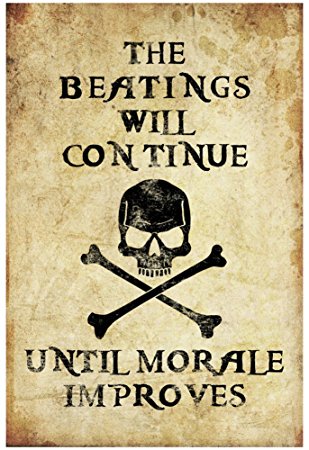
One verifiable result of this author’s complaints (and the Washington State Democratic Party’s complaints against Republicans) is a significant improvement in compliance levels across all spectrums of political committees and candidates. The increasing attention and publicity of campaign finance violations has helped. Most of these were caused by last year’s litigation escalation and the processing of additional lawsuits this year which is likely to keep compliance levels higher than they have been in many years. As the current rash of lawsuits wind their way through court or settlements, many wonder if the compliance achievements are short lived.
Will this law stop anything?
Will HB 2938 stop anything? It certainly won’t stop the renewed interest in campaign finance reform. In addition to the minor fixes addressed by this recent law, other reforms are likely to be proposed in the future.
Will it stop the current lawsuits? No, but the volume is likely to wind down not just because of the changes in the new law, but also because general compliance levels have improved. There should be fewer extreme violators to expose and prosecute.
Will it stop this author? No, but it has helped this author attain the goal of some needed modest reforms and improved transparency compliance levels, and for this I want to thank the many candidates and committees with whom I’ve interacted for becoming excellent examples for others of what not to imitate. Without their failures to follow the law, there would have been few lessons to learn and demonstrate for others. Who really wants to stop this when so much good comes out of it?

______________________________________________
OUR CONSTITUTION BEGINS WITH THE PHRASE “WE THE PEOPLE.” IT WAS THE FOUNDER’S INTENT THAT GOVERNMENT BE CREATED BY THE PEOPLE, TO SERVE THE PEOPLE. IT WASN’T THEIR INTENTION FOR THE PEOPLE TO SERVE THE GOVERNMENT. IT WAS ALWAYS INTENDED THAT GOVERNMENT WHICH FAILED TO SERVE THE PEOPLE SHOULD BE “ALTERED OR ABOLISHED.” UNTIL WE RETURN TO THE FOUNDER’S INTENT, WE REMAIN WE THE GOVERNED…
Additional Background articles and documents:
ESHB 2938 – Final Signed Session Law (Effective June 7th)
PDC campaign finance complaint #32210 against Governor Jay Inslee
TVW video of ESHB 2938 passing house on Feb 14, 2018
Washington State Constitution – Last Revision by amendment 1-12-2011
Press Release -AG Ferguson names Peter Lavallee new Communications Director – December 11, 2014
December 16, 2011 AG vs. Moxie Media Campaign Finance Judgement for $290,000
November 2, 2016 – AG vs. Grocery Manufacturers Association Ruling for $19 million
January 20, 2017 – AG vs. Wyman – Stipulation and Judgment for $12,090
The Scorched wasteland of Washington’s campaign finance laws
The Chaos of campaign finance compliance and the disarray of the Dems
The Rough Road ahead – campaign finance reform in Washington State
ShiftWA – PDC overlooks Democrat campaign finance violations – again
Seattle Times – “State GOP says campaign-watchdog agency chief is biased, must resign”
The Columbian – “Republicans renew call for PDC Chief to quit over Probst case”
AG Press Releases about Tim Eyman over last 15 months:
AG Press Release – “Ferguson files $2.1M Campaign Finance lawsuit against Tim Eyman”
AG Press Release – “AG Ferguson Demands Documents be disclosed in Eyman Investigation”
AG Press Release – “AG asks courts to hold Eyman, Committees, in Contempt”
AG Press Release – “AG Subpoenas enforced by court in Tim Eyman probe”
AG Press Release – “In AG Investigation, Court Finds Tim Eyman violated June 29 Order”
AG Press Release – “Tim Eyman, Committees pay AG $20K in Costs and Fees for months of delay”
AG Press Release – “AG: Judge Orders Signature Gathering Firm to disclose documents in Eyman probe”
AG Press Release – “Court rejects motion to dismiss 2 Defendants in Eyman campaign finance case”
AG Press Release – “Eyman and Committees violated campaign accounting and disclosure laws”










I want to thank the many candidates and committees with whom I’ve interacted for becoming excellent examples for others of what not to imitate. At least the Democrats can do some good for a change. (Sorry I just could not help myself)
Pat, everyone has to find their place in the universe…
Comments are closed.